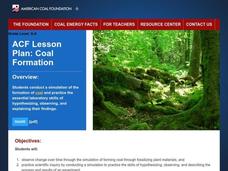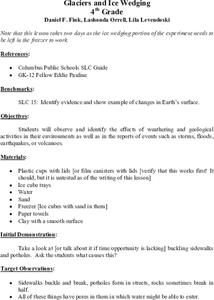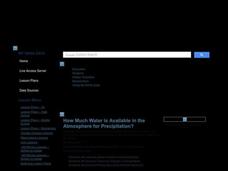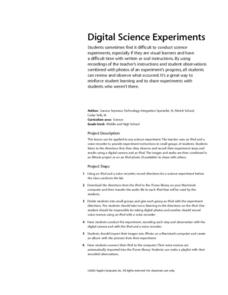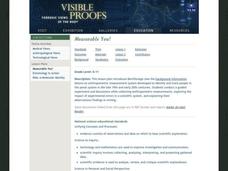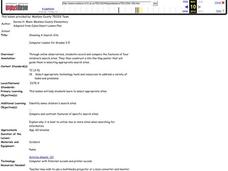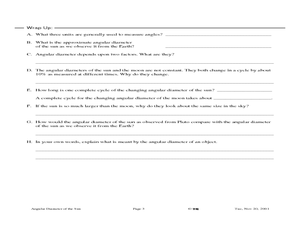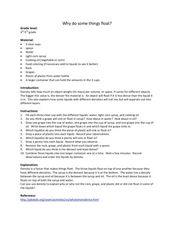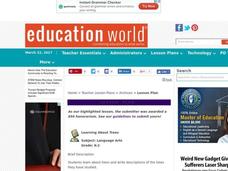Curated OER
Overflowing the Banks
Students discover how levees hold a river within its banks and cause height of river to rise & back up into less well-protected tributaries that feed into the river, by constructing model of riverbanks, creating a flood, &...
Curated OER
Coal Formation
Learners perform an in-depth study of coal - one of most important fossil fuels. Over a three-week period of time, they become familiar with how coal is formed underground, and will create a "fossil" right there in the classroom in order...
Curated OER
WET Science Lesson #5: Pass the Salt Please! (How Road Salt Affects Wetlands)
As an anticipatory set, biologists listen to the story of Ruth Patrick, a scientist who used algae to detect water quality. They observe a demonstration of osmosis and diffusion. In their lab groups, they place Elodea stalks in...
Curated OER
Glaciers and Ice Wedging
Fourth graders observe and identify a variety of weathering and geological activities in the area in which they live. This focuses primarily on what happened during the Ice Age, and how, even today, glaciers are shaping and re-shaping...
Curated OER
Physical Changes and States of Matter - Two
Here's a wonderful lesson on how substances change states. Groups of learners are given trays with a chocolate bar, a piece of paper, an ice cube, and a balloon. During the activity, the groups closely observe the changes that each...
Curated OER
How Much Water is Available in the Atmosphere for Precipitation?
Students explore the relationship between the amount of water in the atmosphere available for precipitation and the actual precipitation observed by satellite. They examine seasonal changes in precipitation. They practice using Internet...
Curated OER
Chemistry Day With Glitter Wands
First graders observe examples of the three states of matter and identify matter in each of the three states. They make glitter wands to remind them of the three states of matter: solid, liquid and gas. Pupils brainstorm and record...
Curated OER
Chemical Changes Making Foam and Using Indicators
Students are able to observe chemcial and physical changes while producing a brilliant formation of foam. They are able to experience the use of an indicator in the reaction. Students record information based on their observations.
Curated OER
Digital Science Experiments
Students listens to an iPod and a voice recorder, in which the teacher provides the experiment instructions. They listen to the directions first, then they observe and record their experiments steps and results using a digital camera and...
Curated OER
Ocean Life
Mini-marine biologists use Scholastic Explorers website to learn about declining numbers of leatherback sea turtles and dusky dolphins. They fill out a K-W-L chart and observation journal worksheet, which are both provided in the lesson...
Curated OER
Measurable You!
Conduct guided experiments and discussions while collecting anthropometric measurements. Your class will explore impact of experimental errors in a scientific system, and explain their observations/findings in writing. An introduction to...
Curated OER
Graphing Equivalent Fractions
Learners graph families of equivalent fractions and compare them by observing the slope of the line formed by each fraction family. They place fractions in ascending order by comparing the slopes of each line after several families of...
Curated OER
Cup Capacity Tool: Measuring Cup
Students examine containers and their capacity. They fill a one-cup measuring cup with water and pour cups of water into other containers. Through observation, students discover how many cups make a pint, and how many teaspoons make a...
Curated OER
Choosing A Search Site
Computer savvy kids construct a lift-the-flap poster to aid them in selecting appropriate search sites for research and information gathering. Through online observations, they record and compare the features of four children's search...
Curated OER
Exploration of "Pillbugs"
Fifth graders define vocabulary terms, identify the characteristics of a pillbug, and create a dichotomous key. Then they examine the pillbugs and make observations and record these observations. Finally, 5th graders observe specific...
Curated OER
Mystery of Mirrors: Discovery Stations
Hands-on stations in which groups of primary learners experience what mirrors can do provide opportunities for experimenting and authentic discovery. Recording their observations in complete sentences seems age-inappropriate. Drawing...
Curated OER
Sequence of Events: The Watershed
Class members simulate a watershed with a painters drop cloth, placing objects underneath to create landscape variation, making "rain" with a watering can, and using red drink mix powder to track the path of precipitation. They observe...
Curated OER
"Who am I?"
Pupils of all ages work in pairs to find information about themselves and record a digital "Who am I?" They observe and measure each other, write clues, and illustrate before having others guess who is described.
Curated OER
Let's Learn About Plants!
Students discover different plants and plant parts by observing their campus. In this plant life lesson, students take a guided walk around their school with a magnifying glass examining everyday plants as well as photographing them....
Curated OER
Water Pressure Blaster
Third graders complete an experiment to introduce them to the concept of water pressure. In this water pressure lesson plan, 3rd graders create pressure in a water bottle and observe the force of water that is created.
Curated OER
Angular Diameter of the Sun
Starting with a paragraph of information presenting the different ways we can observe planetary objects, pupils work through these instructions to see how they can observe and measure angles. Your class will discover how these angles...
Curated OER
Why Do Some Things Float?
Students recognize that density determines whether objects sink or float. In this sink or float lesson, students experiment with plastic in three liquids. students drop their objects into the liquids and observe and record their results.
Curated OER
Dining Out With Fishes and Birds of the Hudson
The class will make observations to determine how environment has shaped the way particular birds and fish eat. They will view a series of photographs, read two short articles, and then consider how food availability has determined how...
Curated OER
Learning About Trees
After looking at pictures of trees, discussing tree growth, and identifying the parts of a tree, lead your class on a nature walk and have them collect samples and record their observations. They then work in pairs to polish the...
Other popular searches
- Observation and Inferences
- Observation Skills
- Student Teacher Observation
- Observation Inference
- Making Observations
- Scientific Observation
- Inference and Observation
- Observation Log
- Weather Observation Chart
- Observations and Inferences
- Direct Observation
- Science Observation Skills



